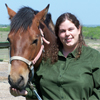In Grist’s Food Fight series, experts, pundits, and an elite cadre of Grist contributors and readers debate hot-button food issues via a — what else! — virtual roundtable. Strap on your aprons, gloves, and protective hairnets and join us!
Although the Senate failed to pass the Food Safety Modernization Act (S. 510) before the election, word is that it will take it back up during the lame-duck session in November. We’ve invited 10 people from the various sides of this complicated yet crucial debate to discuss whether there is indeed a food-safety crisis, whether S. 510 will make it better (as Elanor Starmer argued on Grist), and whether it might throw small producers under the bus in doing so (as David Gumpert countered).
We’ll be publishing the dialogue in installments, starting later today. If you think we’re missing the (oh-so-unsafe sushi) boat on something, please set us straight in the comments section.
Our illustrious panelists are:
 Michael Bulger, a master’s candidate in food studies at New York University: Before enrolling in graduate school, Michael worked extensively in the restaurant and food retail industries. In addition, Michael has volunteered in soup kitchens and on a farm that produces fresh food for SNAP recipients and food deserts. He currently lives in Brooklyn, N.Y., where he blogs about food related issues. Michael was plucked from Grist’s readership to participate in the debate.
Michael Bulger, a master’s candidate in food studies at New York University: Before enrolling in graduate school, Michael worked extensively in the restaurant and food retail industries. In addition, Michael has volunteered in soup kitchens and on a farm that produces fresh food for SNAP recipients and food deserts. He currently lives in Brooklyn, N.Y., where he blogs about food related issues. Michael was plucked from Grist’s readership to participate in the debate.
 Kathleen Chrismer, food-safety advocate: A paralegal in Las Vegas, Kathleen joined the victim advocacy organization, Safe Tables Our Priority (S.T.O.P.) in 2007 following her daughter Rylee’s recovery from kidney failure and other life-threatening illnesses caused by E. coli O157:H7 contaminated spinach. Since 2009, she has been a volunteer food-safety advocate, raising public awareness of food-borne illness and taking Rylee’s story and the stories of other victims to Capitol Hill in the effort to pass meaningful food safety legislation.
Kathleen Chrismer, food-safety advocate: A paralegal in Las Vegas, Kathleen joined the victim advocacy organization, Safe Tables Our Priority (S.T.O.P.) in 2007 following her daughter Rylee’s recovery from kidney failure and other life-threatening illnesses caused by E. coli O157:H7 contaminated spinach. Since 2009, she has been a volunteer food-safety advocate, raising public awareness of food-borne illness and taking Rylee’s story and the stories of other victims to Capitol Hill in the effort to pass meaningful food safety legislation.
 David E. Gumpert, health and food issues reporter: David is the author of The Raw Milk Revolution: Behind America’s Emerging Battle Over Food Rights. He also writes a popular blog, The Complete Patient, where he has covered a number of health and regulatory issues, focusing heavily on regulatory excesses involving raw milk and food safety, and contributes regularly to Grist. In addition, David is a well-known business writer, a former staff reporter for The Wall Street Journal, and small business editor of the Harvard Business Review. His most recent business book is Burn Your Business Plan! What Investors Really Want from Entrepreneurs.
David E. Gumpert, health and food issues reporter: David is the author of The Raw Milk Revolution: Behind America’s Emerging Battle Over Food Rights. He also writes a popular blog, The Complete Patient, where he has covered a number of health and regulatory issues, focusing heavily on regulatory excesses involving raw milk and food safety, and contributes regularly to Grist. In addition, David is a well-known business writer, a former staff reporter for The Wall Street Journal, and small business editor of the Harvard Business Review. His most recent business book is Burn Your Business Plan! What Investors Really Want from Entrepreneurs.
 Mark Kastel, co-founder of The Cornucopia Institute and director its Organic Integrity Project: A Wisconsin-based farm policy research group, the Cornucopia Institute seeks to promote economic justice for family-scale farmers. Prior to its launch, Mark was president of M. A. Kastel and Associates, through which he consulted and lobbied on behalf of family farm groups. Before making the paradigm shift to sustainable agriculture, Mark worked for the agribusiness giants International Harvester and J.I. Case. He lives on a 160-acre organic farm in the rugged hills of southwestern Wisconsin.
Mark Kastel, co-founder of The Cornucopia Institute and director its Organic Integrity Project: A Wisconsin-based farm policy research group, the Cornucopia Institute seeks to promote economic justice for family-scale farmers. Prior to its launch, Mark was president of M. A. Kastel and Associates, through which he consulted and lobbied on behalf of family farm groups. Before making the paradigm shift to sustainable agriculture, Mark worked for the agribusiness giants International Harvester and J.I. Case. He lives on a 160-acre organic farm in the rugged hills of southwestern Wisconsin.
 Jean Halloran, director of food policy initiatives at Consumers Union, publisher of Consumer Reports: In her 28 years at CU, Jean has led many projects on food safety, sustainable consumption, and trade issues. She currently develops policy and staff initiatives on biotechnology, mad cow disease prevention, mercury in fish, and bacteria in meat, poultry, and produce. She presently serves on the U.S. State Department’s Advisory Committee on International Economic Policy; from 2004 to 2006, she served on the FDA’s Food Advisory Committee as well as on the National Academy of Sciences’ Board on Agriculture and Natural Resources.
Jean Halloran, director of food policy initiatives at Consumers Union, publisher of Consumer Reports: In her 28 years at CU, Jean has led many projects on food safety, sustainable consumption, and trade issues. She currently develops policy and staff initiatives on biotechnology, mad cow disease prevention, mercury in fish, and bacteria in meat, poultry, and produce. She presently serves on the U.S. State Department’s Advisory Committee on International Economic Policy; from 2004 to 2006, she served on the FDA’s Food Advisory Committee as well as on the National Academy of Sciences’ Board on Agriculture and Natural Resources.
 Ferd Hoefner, policy director for the National Sustainable Agriculture Coalition: Ferd has been NSAC’s senior Washington, D.C. representative since 1988. NSAC advocates for policies and programs supporting the long-term sustainability of agriculture, natural resources, and rural communities on behalf of 80 grassroots-based farm, food, conservation, and rural organizations from all regions of the country. Prior to his work with NSAC, Ferd represented Interfaith Action for Economic Justice and its predecessor, the Interreligious Taskforce on U.S. Food Policy, on federal farm, food, and international development policy issues.
Ferd Hoefner, policy director for the National Sustainable Agriculture Coalition: Ferd has been NSAC’s senior Washington, D.C. representative since 1988. NSAC advocates for policies and programs supporting the long-term sustainability of agriculture, natural resources, and rural communities on behalf of 80 grassroots-based farm, food, conservation, and rural organizations from all regions of the country. Prior to his work with NSAC, Ferd represented Interfaith Action for Economic Justice and its predecessor, the Interreligious Taskforce on U.S. Food Policy, on federal farm, food, and international development policy issues.
 Russell Libby, executive director of the Maine Organic Farmers and Gardeners Association: Trained as an economist, Russell has led MOFGA, the largest state-based organic association in the country, for over 15 years and is active with the National Organic Coalition, Maine Farmland Trust, the Eat Local Foods Coalition, Agricultural Council of Maine, and the University of Maine Board of Agriculture. He has a small organic farm in Mount Vernon, Maine, where he is also a selectman.
Russell Libby, executive director of the Maine Organic Farmers and Gardeners Association: Trained as an economist, Russell has led MOFGA, the largest state-based organic association in the country, for over 15 years and is active with the National Organic Coalition, Maine Farmland Trust, the Eat Local Foods Coalition, Agricultural Council of Maine, and the University of Maine Board of Agriculture. He has a small organic farm in Mount Vernon, Maine, where he is also a selectman.
 Patty Lovera, assistant director of Food & Water Watch: Patty has a bachelor’s degree in environmental science from Lehigh University and a master’s degree in environmental policy from the University of Michigan. Before joining Food & Water Watch, Patty was the deputy director of the energy and environment program at Public Citizen and a researcher at the Center for Health, Environment and Justice.
Patty Lovera, assistant director of Food & Water Watch: Patty has a bachelor’s degree in environmental science from Lehigh University and a master’s degree in environmental policy from the University of Michigan. Before joining Food & Water Watch, Patty was the deputy director of the energy and environment program at Public Citizen and a researcher at the Center for Health, Environment and Justice.
 Judith McGeary, founder and executive director of the Farm and Ranch Freedom Alliance: Following a clerkship with the Federal Fifth Circuit Court of Appeals, Judith practiced as an attorney d
Judith McGeary, founder and executive director of the Farm and Ranch Freedom Alliance: Following a clerkship with the Federal Fifth Circuit Court of Appeals, Judith practiced as an attorney d
oing a combination of administrative law, litigation, and appeals. After seeing first-hand how government regulations benefit industrial agriculture at the expense of family farms, she founded FARFA to provide a voice for independent agriculture. She and her husband run a grass-based farm in Central Texas with sheep, cattle, poultry, and horses, and are active with Holistic-Management International-Texas, the Weston A. Price Foundation, and the Texas Organic Farmers and Gardeners Association.
 Tom Philpott, Grist’s senior food and agriculture writer: Philpott is a cofounder and core-group member at Maverick Farms, a center for sustainable food education in Valle Crucis, N.C. Before moving to the farm in 2004, Philpott worked as a financial journalist in Mexico City and New York City, most recently holding the title of equity research editor for Reuters, where he wrote daily dispatches on the stock market. His work on food politics has appeared in Newsweek, Gastronomica, The Guardian, Mother Earth News, New Farm, and Sojourners.
Tom Philpott, Grist’s senior food and agriculture writer: Philpott is a cofounder and core-group member at Maverick Farms, a center for sustainable food education in Valle Crucis, N.C. Before moving to the farm in 2004, Philpott worked as a financial journalist in Mexico City and New York City, most recently holding the title of equity research editor for Reuters, where he wrote daily dispatches on the stock market. His work on food politics has appeared in Newsweek, Gastronomica, The Guardian, Mother Earth News, New Farm, and Sojourners.
 Bonnie Azab Powell, Grist food editor and Food Fight moderator: A dot-com-bubble rider turned university refugee, Bonnie cofounded one of the first “food-politics” blogs, The Ethicurean, in May 2006, which coined that term to describe someone interested in sustainable, organic, local, and ethical (SOLE) food that also happens to be tasty. Her writing has appeared in a bunch of places printed on dead trees. She lives in the Bay Area, where she gardens half-assedly and cooks wholeheartedly while running two meat CSAs for small local farms.
Bonnie Azab Powell, Grist food editor and Food Fight moderator: A dot-com-bubble rider turned university refugee, Bonnie cofounded one of the first “food-politics” blogs, The Ethicurean, in May 2006, which coined that term to describe someone interested in sustainable, organic, local, and ethical (SOLE) food that also happens to be tasty. Her writing has appeared in a bunch of places printed on dead trees. She lives in the Bay Area, where she gardens half-assedly and cooks wholeheartedly while running two meat CSAs for small local farms.



